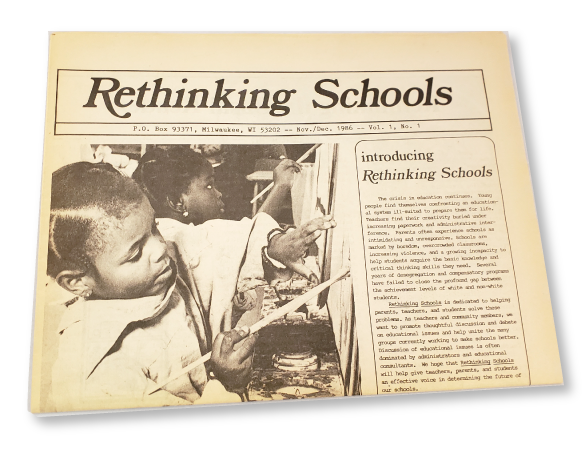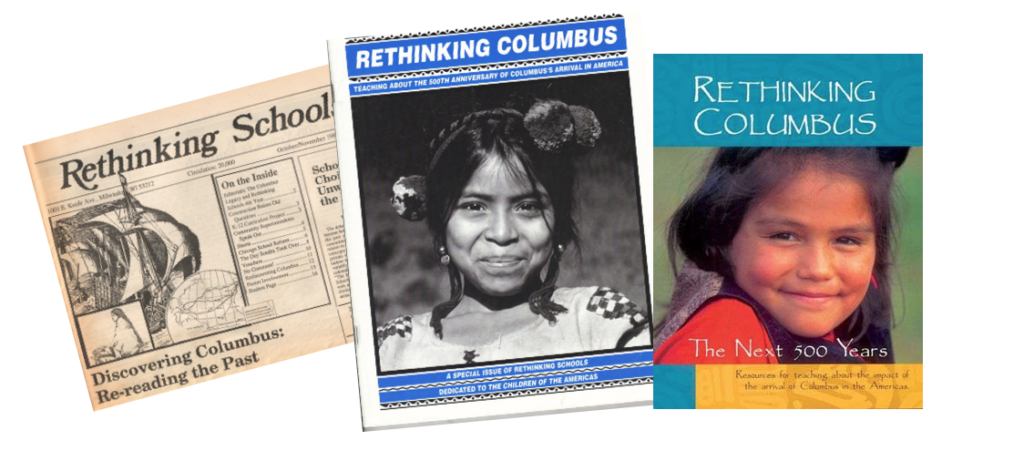Rethinking Schools History
Rethinking Schools began in 1986, when a group of Milwaukee education activists — teachers, teacher educators, and community members — met to talk about how they could bring more critical voices into the conversation about public schools and libraries. These founding Rethinking Schools editors saw a school curriculum that was conservative, dumbed-down, and dominated by corporate-produced textbooks. Inappropriate standardized testing was rampant. Racial bias infected every level of schooling.

Bob Peterson delivering Rethinking Schools, 1992
These education activists launched Rethinking Schools as a voice to articulate alternatives. We began as a quarterly tabloid, distributed free in Milwaukee schools, and have published continuously since 1986.
Today, we have become the preeminent publisher of social justice education materials in the United States. Our quarterly magazine has subscribers in all 50 states, all 10 Canadian provinces, and around the world. Our books are used in teacher education programs, by social organizations and teachers’ unions, and by classroom teachers everywhere. Our Zinn Education Project — coordinated with Teaching for Change — has more than 100,000 educators who have registered to access our “people’s history” materials.

In 1991, on the eve of the Columbus Quincentenary, we published our first book, Rethinking Columbus. We went out on a limb and printed 30,000 copies. Those sold out within the first month, and Rethinking Columbus sold 1,000 copies a day for three solid months. Through the years, Rethinking Columbus has sold about 300,000 copies, and articles in the book have been reprinted everywhere. Rethinking Columbus workshops have been sponsored by teacher unions, teacher education programs, Native American organizations, and school districts. As the historian Howard Zinn said, Rethinking Columbus “made educational history” and changed the way Columbus is taught in schools throughout the United States.

Rethinking Columbus showed us that teachers were hungry for practical and critical social justice teaching materials. In 1994, we followed up with Rethinking Our Classrooms: Teaching for Equity and Justice. It collected the best classroom teaching articles from Rethinking Schools magazine — then still a tabloid. Like Rethinking Columbus, Rethinking Our Classrooms sold tens of thousands of copies. Both Rethinking Our Classrooms, and Rethinking Our Classrooms, Volume 2 (2001), became key texts in teacher education programs — offering stories of how K–12 teachers engage students in ways that are critical and grounded in students’ lives, and articulate what social justice education looks like in practice.
Since these two publications, Rethinking Schools has regularly published books in numerous disciplines and topics: race, culture, and language (The Real Ebonics Debate, Rethinking Multicultural Education, Rethinking Bilingual Education, Teaching for Black Lives, Rethinking Ethnic Studies), gender (Rethinking Sexism, Gender, and Sexuality), teaching language arts (Reading, Writing, and Rising Up, Teaching for Joy and Justice, Rhythm and Resistance: Teaching Poetry for Social Justice), teacher unions and school reform (Transforming Teacher Unions, Rethinking Schools: An Agenda for Change (with The New Press), Rethinking School Reform, the forthcoming Teacher Unions and Social Justice), standardized testing (Failing Our Kids and Pencils Down), history and social studies (Rethinking Globalization, Rethinking Popular Culture and Media, Teaching About the Wars, Rethinking “Indian” Stereotypes (a DVD), The Line Between Us: Teaching About the Border and Mexican Immigration, A People’s History for the Classroom, Teaching a People’s History of Abolition and the Civil War), mathematics (Rethinking Mathematics), young children and elementary teaching (Rethinking Early Childhood Education and Rethinking Elementary Education), climate and environmental justice (A People’s Curriculum for the Earth), and a bestselling handbook for beginning teachers (The New Teacher Book).
Although our primary work is advocacy through publication, Rethinking Schools has always supported education activism. Rethinking Schools editors were instrumental in launching a community struggle in Milwaukee to establish La Escuela Fratney in 1988 as Wisconsin’s first two-way Spanish-English bilingual program — a school characterized by robust parent involvement and multicultural-antiracist curriculum. Rethinking Schools editors were founding members of the National Coalition of Education Activists (NCEA), an important multi-racial organization of parents, community activists, and educators united to defend and transform public schools. Although NCEA no longer exists, Rethinking Schools has been active in supporting regional gatherings like the Northwest Teaching for Social Justice Conference (in Seattle and Portland), Teachers 4 Social Justice (in San Francisco), the Cross-Border Conference on Teaching for Social Justice (sponsored by the British Columbia Teachers Federation and the Surrey Teachers Association), the Chicago Teachers for Social Justice Curriculum Fair, and other national gatherings, including the Teacher Activist Group network. For several years, Rethinking Schools collaborated with the San Francisco-based human rights organization Global Exchange to lead educator tours to the U.S.-Mexico border, as part of a “From the World to Our Classrooms” project. We have also collaborated with the National Education Association on week-long “Power of the Pen” writing retreats for teachers from around the country, and recently convened two regional gatherings of early-career teachers, which led to our latest edition of The New Teacher Book. Rethinking Schools editors continue to speak widely and lead workshops throughout the United States and Canada, and around the world.
From its beginnings in the late 1980s, Rethinking Schools raised the alarm about school privatization — both private voucher school programs, like the one implemented in Milwaukee in 1989, and other forms of public school privatization and commercialization. In 1992, we published a special issue of Rethinking Schools in pamphlet form False Choices: Why School Vouchers Threaten Our Children’s Future and Selling Out Our Schools: Vouchers, Markets, and the Future of Public Education in 1996. We also published Funding for Justice in 1997 to address inequitable and inadequate funding for our public schools. Over the years we have analyzed and advocated on numerous educational policy issues – from the religious right’s agenda for public schools, to the racist origins and the harmful impact of standardized testing.
In 2008, the noted historian Howard Zinn, author of the classic A People’s History of the United States, asked Rethinking Schools and the Washington, DC-based education nonprofit, Teaching for Change, to collaborate on an online project to provide teachers access to classroom-tested “people’s history” teaching materials, student-friendly articles, and recommendations for social justice books and films. Later that year, we launched the Zinn Education Project, which as of the spring of 2020 has 107,000 educators who have registered to access free downloadable lessons. Throughout the spring and early summer of 2020, the Zinn Education Project sponsored “People’s Historians Online,” a seminar series bringing together hundreds of teachers weekly to learn about and discuss critical issues in U.S. history.
In 2011, a Rethinking Schools exposé of the link between the coal industry and Scholastic, Inc. — including a glossy Scholastic-produced curricular paean to burning coal for energy — led to a national campaign coordinated by Rethinking Schools, the Campaign for a Commercial-Free Childhood, Greenpeace, the Center for Biological Diversity, and other environmental organizations, demanding that Scholastic cut its ties with the coal industry. After a New York Times article covering Rethinking Schools’ critique, and a New York Times editorial, “Scholastic’s Big Coal Mistake,” Scholastic publicly agreed to terminate its ties with the coal industry and to stop distributing its pro-coal curriculum.
Rethinking Schools was also drawn into the national spotlight the following year when Tucson, Arizona, Public Schools banned our book Rethinking Columbus, as part of its suppression of the wildly successful Mexican American Studies Program. Rethinking Columbus was one of seven adopted texts in the program, and when the school district banned the Mexican American Studies Program, at the insistence of the Republican-dominated legislature and state department of education, school administrators went into classrooms and confiscated copies of Rethinking Columbus as students were reading them. Rethinking Schools covered this controversy extensively, organizing support for the Mexican American Studies Program, and editors were interviewed in national media. Ultimately, a federal judge ruled that the school district had violated students’ First and Fourteenth Amendment rights, and that the banning of the program was motivated by “racial animus.”
Seattle Rethinking Schools editors played an instrumental role in launching the national Black Lives Matter at School Week of Action. These began at one Seattle elementary school where a Rethinking Schools editor’s son attended. What began in the fall of 2016 as a bomb threat ended with a mass community outpouring of defiance against white supremacist hate — which joined teachers, students, parents, administrators, and the broader community. Around the country, the Black Lives Matter at School Week of Action activists have demanded ethnic studies in all schools, the replacement of zero-tolerance discipline policies with restorative justice practices, and an end to the racial segregation in schools reinforced by so-called ability group tracking.
Rethinking Schools has also played a key role in climate justice education work in schools, helping to initiate and promote the most comprehensive climate justice policy in the United States, adopted by the Portland, Oregon, school board in 2016. Through our Zinn Education Project, Rethinking Schools helped launch the Teach Climate Justice Campaign, with the most extensive collection of climate justice curriculum materials available, which has brought together educators around the country.
Rethinking Schools’ offices are still based in Milwaukee, where our project began, although we have now editors in Madison, Wisconsin; Seattle; Portland, Oregon; Philadelphia; New Jersey; and Columbus, Ohio. Our editors include practicing classroom teachers, retired teachers, teacher educators, teacher union activists, elected school board members, education policymakers, and Writing Project directors — for a total of more than 200 years of classroom teaching experience.
More than 30 years after our founding, Rethinking Schools remains a nonprofit publisher and advocacy organization dedicated to sustaining and strengthening public education through social justice teaching and education activism. Our magazine, books, resources, and projects promote equity and racial justice in the classroom. We encourage grassroots efforts in our schools and communities to enhance the learning and well-being of our children, and to build broad democratic movements for social and environmental justice.
